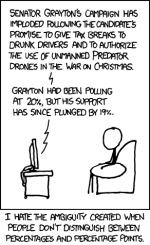dystopian
Veteran Member
Usually it involves providing identification of some sort (voter ID laws).
I was actually surprised to find that the US rules for identifying its voters are something of a mess. It seems our system is much more sensible. Every municipality maintains a registry of eligible voters, several weeks before an election every voter receives a polling notification. When we vote, we have to present both the notification and a photo ID (which may be expired by a few years).
I have to admit though, the Swiss system is insane enough that it sounds awesome:
"Men, however, are still allowed to present a bayonet – a sword that was generally passed down from generation to generation – which served as the only form of voting identification up until 1991"


